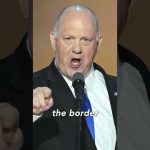In recent discussions at the Pentagon, officials have begun to contemplate how they might respond if Donald Trump were to give orders to deploy active-duty troops for domestic situations. Many see this as an alarming reflection of a deepening political divide in the United States. While Trump himself may not directly issue such commands, the fact that military leaders are discussing potential scenarios speaks volumes about the state of governance and public trust in America today.
Throughout history, the relationship between political leaders and the military has shaped the trajectory of nations. This relationship should ideally be rooted in mutual respect and a shared commitment to uphold the Constitution. However, as tensions rise in this era, questions arise about the integrity of military leadership and its alignment with the elected government. The conversation around mass deportations and the potential use of military force to control civil unrest echoes moments in history when governments opted for force in times of division. These decisions often left lasting scars on the fabric of a nation.
The military’s role in domestic affairs is a contentious issue. Many Americans fear what it would mean for democracy if troops were used against citizens. This sentiment points to a fundamental belief in civilian oversight of the military, a principle rooted in our founding fathers’ vision. They understood that a powerful military held the potential for abuse, and they sought to create mechanisms that would safeguard against such tyranny. The thought that Pentagon officials are already strategizing for possible directives from a president raises eyebrows about loyalty to the Constitution versus loyalty to a single leader.
The notion that military leaders must evaluate whether to follow orders from a sitting president against their ethical standards highlights a troubling precedent. Troops are sworn to protect the Constitution, yet the lines become blurred in a politically charged atmosphere where motives and loyalties are questioned. Reflecting on historical conflicts, it becomes apparent that the balance of power and trust between military leaders and the commander-in-chief is fragile; it could lead to catastrophic outcomes once disrupted.
Moreover, recent administrations’ speech patterns and policies have manifested a growing sense of division within the armed forces. As seen in past eras, such as during the Vietnam War, divisions within military ranks can lead to resignations and dissent, fundamentally altering the military’s effectiveness and purpose. Soldiers who dedicate their lives to serving and protecting American freedoms are now caught in a political landscape where their actions may be driven by ideology rather than duty. This predicament raises ethical questions about military leaders’ role in a society where political allegiances fracture national unity.
As history often teaches, it is in times of insecurity that clarity of purpose and adherence to founding principles become crucial. A society that thrives on collective trust must not lose sight of the values that bind its citizens. Reflecting on these discussions at the Pentagon, the weight of responsibility rests on both military and political leaders to foster an environment of honor, integrity, and fidelity to the Constitution—a legacy worth preserving for generations to come.




